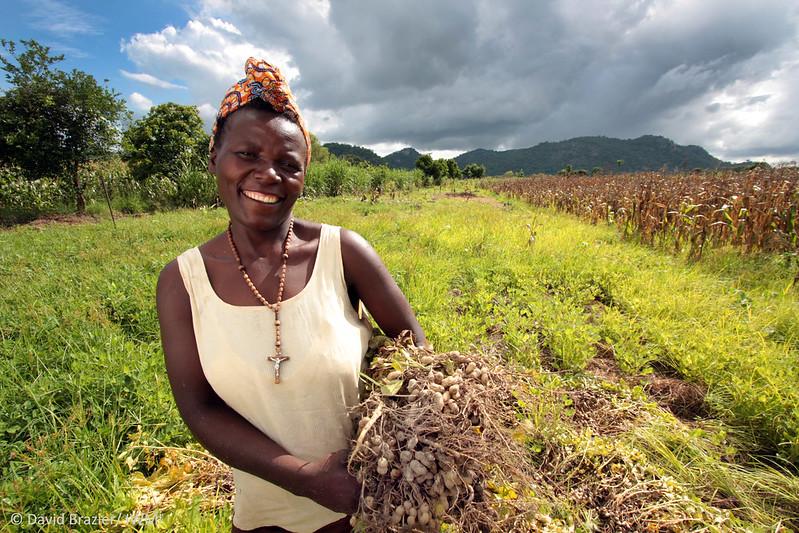Developing Agriculture Insurance to Protect Smallholder Farmers in Zimbabwe

Well-designed insurance programs can help to improve farmers’ resilience, access to finance, and high-quality inputs. To this end, IFC and Zimbabwe's insurance regulator, the Insurance and Pensions Commission (IPEC), issued a press release highlighting their collaboration to create a market for agricultural insurance products in Zimbabwe. The goal is to protect smallholder farmers against weather-related crop damage and other shocks.
Through this project, the team will assess the risks faced by smallholder farmers, and their coping mechanisms, and also evaluate the farmers' appetite for agricultural insurance to protect their livelihoods. The team will also help IPEC develop a regulatory framework and enabling environment for agricultural insurance and determine the features of insurance products appropriate for Zimbabwe's farmers. In this interview we are talking with the Team Leader, Sharon Adhiambo Onyango, to get her views on the project in general, and on the agriculture insurance component in the country in particular.
GIIF: Sharon, could you please give us an overview of the challenges faced by the agricultural sector in Zimbabwe and the background leading to this recently announced project in the country?
Agricultural production in Zimbabwe is dominated by smallholder farmers, who also tend to have a lower capacity to cope with the financial impact of different shocks. The sector is highly vulnerable to climate risk – especially drought - which results in low productivity and food insecurity. In 2019 and 2020, for instance, the GDP shrunk by 6% and 4.1% (respectively) due to the combined effects of drought, Cyclone Idai, the COVID-19 pandemic, and macroeconomic instability. About 4 million people became food insecure following the severe drought in 2015/16 (World Bank 2019).
Through the recently launched National Development Strategy 1: 2021 - 2025 (NDS1), the Government of Zimbabwe (GoZ) seeks to promote accelerated, inclusive socio-economic transformation over the next 5 years, to support the country's achievement of middle-income status by 2030. Anticipated reforms under the Strategy will be driven by a competitive private sector-led economy. The GoZ has prioritized the capacitation of key national institutions - such as the Insurance and Pensions Commission (IPEC) - which play a critical role in providing an enabling environment for private sector investment. It is within this context that the IPEC approached IFC for support in developing an enabling environment for index insurance to promote improved climate resilience and financial inclusion.
GIIF: Could you please share with us some highlights of the project; its components and the expected outcome?
So far, IPEC has adopted a rules-based approach to regulating the few index-based products currently on the Zimbabwean market. This form of regulation provides a strict set of guidelines within which insurers need to operate. To promote more sustainable market growth, the regulator is keen on developing a more holistic regulatory framework that would be conducive to index insurance innovation, while providing more clarity on different insurance stakeholder roles and safeguarding their interests.
The overall objective of this project is to prepare IPEC for the development of a suitable enabling environment for agriculture/climate insurance in Zimbabwe. We aim at reaching this objective by improving IPEC's understanding of the current market status and its growth potential. We will do so by conducting a market assessment to evaluate key climatic risks that farmers are exposed to, the current and projected demand for insurance, the capacity and appetite for climate insurance provision within the insurance industry, and the current enabling environment. Key findings of this assessment will be discussed with market stakeholders at a validation workshop.
The project also aims at providing IPEC with the tools and knowledge required to develop a suitable regulatory framework. Overall, this project aims at supporting IPEC in developing the market for agricultural index insurance in Zimbabwe through various technical assistance and capacity-building components.
GIIF: This is indeed a significant development for the agriculture sector in Zimbabwe considering the WBG’s multi-dimensional support to improve sustainability, resilience, and the welfare of farmers and the most vulnerable.
We thank Sharon Adhiambo Onyango (Financial Sector Specialist at IFC) for her valuable insights and contribution to this piece.
For the project press release please click here.
Photo Credit: Harvesting groundnuts in Zimbabwe by David Brazier/ International Water Management Institute (IWMI).
